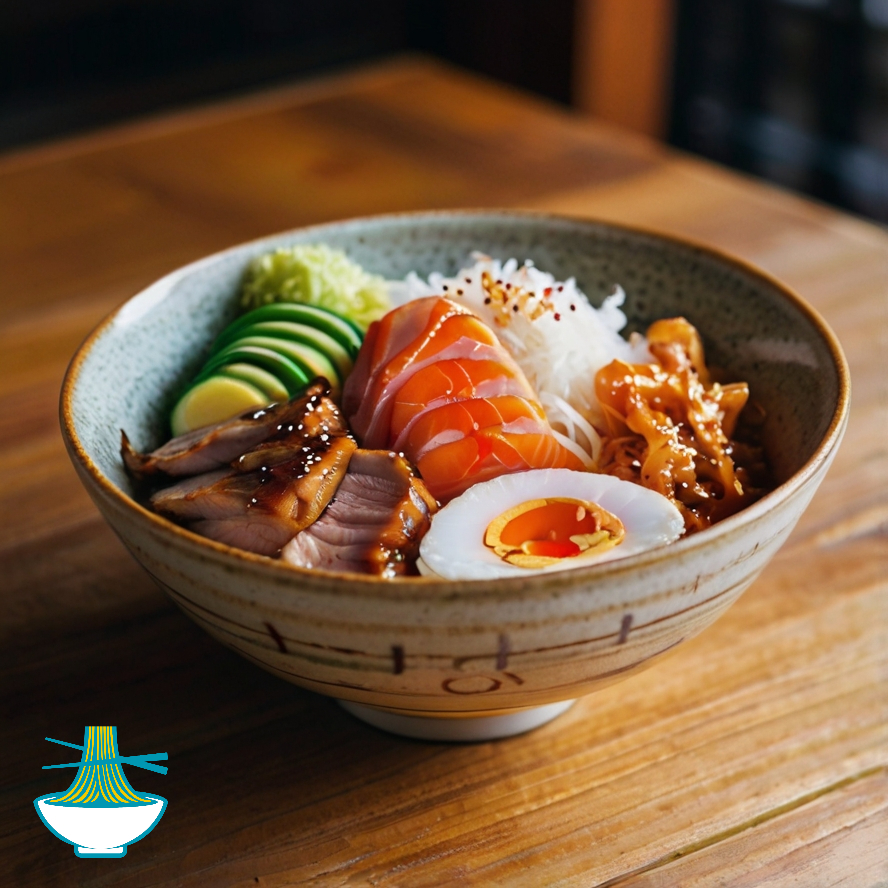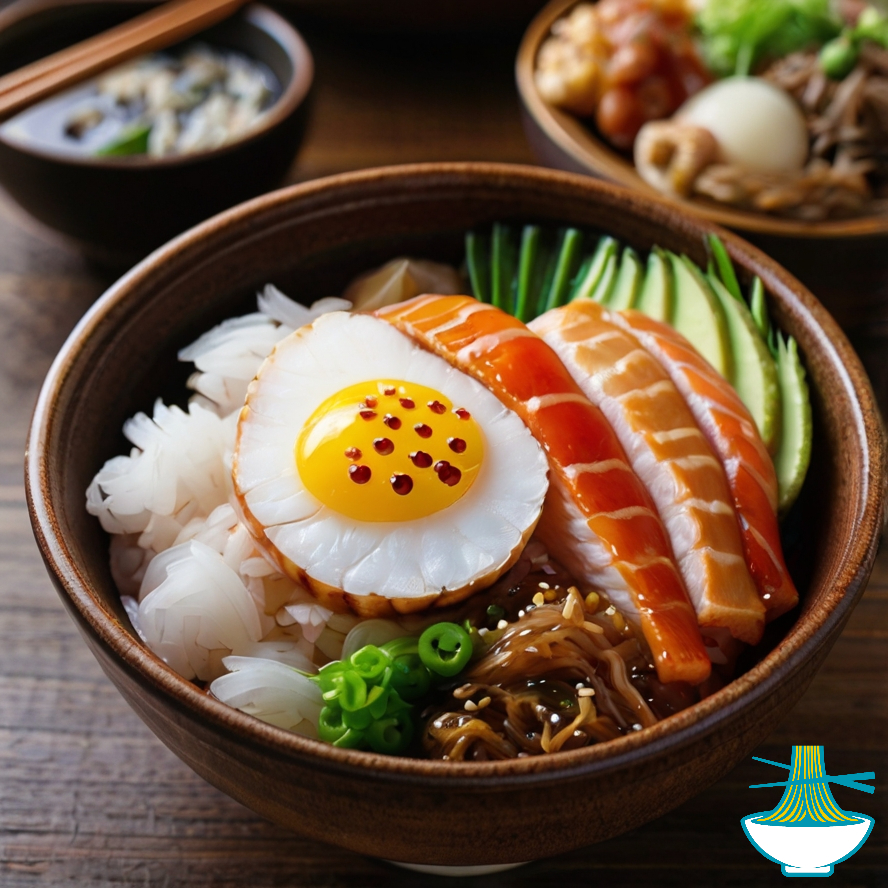Indulge in the flavorful world of Japan's iconic donburi dishes, where steaming rice serves as the canvas for a symphony of tantalizing toppings. From the classic comfort of Gyudon, featuring thinly sliced beef simmered in a savory soy-based sauce, to the vibrant hues and flavors of Chirashi Don, adorned with fresh sashimi atop a bed of seasoned rice, embark on a culinary journey through the bustling streets of Tokyo and beyond. Sample the richness of Unadon, showcasing tender grilled eel glazed with a sweet and savory sauce, or savor the simplicity of Oyakodon, a heartwarming mix of chicken and egg nestled atop rice. Whether you're craving seafood sensations like Kaisen Don, brimming with a medley of marinated seafood, or seeking vegetarian options like Tendon, boasting crispy tempura nestled in a bowl of rice, Japan's donburi dishes offer an irresistible fusion of flavors and textures, promising a gastronomic experience like no other.
Ingredients:
- 250g thinly sliced beef (such as sirloin or ribeye)
- 1 onion, thinly sliced
- 3 tablespoons soy sauce
- 2 tablespoons mirin (sweet rice wine)
- 1 tablespoon sake (Japanese rice wine) or dry sherry
- 1 tablespoon sugar
- 1 tablespoon vegetable oil
- 1 cup dashi stock (you can use instant dashi granules dissolved in water)
- 2-3 cups cooked Japanese short-grain rice
- Optional toppings: sliced green onions, pickled ginger, shichimi togarashi (Japanese seven spice blend), nori (seaweed), or beni shoga (pickled red ginger)
Instructions:
1- Heat the vegetable oil in a large skillet or frying pan over medium heat. Add the sliced onions and cook until they become soft and translucent.
2- Add the thinly sliced beef to the skillet and cook until it starts to brown.
3- In a small bowl, mix together the soy sauce, mirin, sake, and sugar until the sugar dissolves.
4- Pour the soy sauce mixture over the beef and onions in the skillet. Stir well to coat the beef evenly.
5- Add the dashi stock to the skillet and bring the mixture to a simmer. Let it cook for a few minutes until the beef is cooked through and the flavors meld together.
6- Once the beef is cooked, remove the skillet from the heat.
7- To serve, place a portion of cooked rice in a bowl. Spoon the beef and onion mixture over the rice, making sure to include some of the flavorful sauce.
8- Garnish with sliced green onions, pickled ginger, shichimi togarashi, nori, or beni shoga, if desired.
9- Enjoy your homemade Gyudon hot and fresh!
Feel free to adjust the seasoning according to your taste preferences, and you can also customize the toppings based on what you have available or your personal preferences. Enjoy your homemade Japanese donburi!
Nutritional Values :
Here’s a detailed breakdown of the Nutritional Values and Benefits for the ingredients used in preparing this Japanese-style beef rice bowl:
Beef (250g):
- Calories: 625 kcal (approx. 250 kcal per 100g)
- Fat: 50g (approx. 20g per 100g)
- Carbohydrates: 0g
- Protein: 50g (approx. 20g per 100g)
Benefits: High-quality protein, iron, and B vitamins. Supports muscle growth and repair, and provides energy.
Onion (1 medium, ~150g):
- Calories: 60 kcal
- Fat: 0g
- Carbohydrates: 14g
- Protein: 1g
Benefits: Adds flavor; rich in antioxidants, vitamins, and minerals. Supports heart health and digestion.
Soy Sauce (3 tablespoons, ~45ml):
- Calories: 15 kcal
- Fat: 0g
- Carbohydrates: 2g
- Protein: 2g
Benefits: Adds umami flavor with minimal calories.
Mirin (2 tablespoons, ~30ml):
- Calories: 25 kcal
- Fat: 0g
- Carbohydrates: 6g
- Protein: 0g
Benefits: Adds sweetness and depth of flavor.
Sake (1 tablespoon, ~15ml) or Dry Sherry:
- Calories: 15 kcal
- Fat: 0g
- Carbohydrates: 0g
- Protein: 0g
Benefits: Adds complexity and flavor.
Sugar (1 tablespoon, ~12g):
- Calories: 48 kcal
- Fat: 0g
- Carbohydrates: 12g
- Protein: 0g
Benefits: Provides sweetness and balances flavors.
Vegetable Oil (1 tablespoon, ~15ml):
- Calories: 120 kcal
- Fat: 14g
- Carbohydrates: 0g
- Protein: 0g
Benefits: Adds flavor and helps with cooking; provides healthy fats.
Dashi Stock (1 cup, ~240ml):
- Calories: 20 kcal
- Fat: 0g
- Carbohydrates: 1g
- Protein: 1g
Benefits: Enhances umami flavor with minimal calories.
Japanese Short-Grain Rice (2-3 cups, ~400-600g cooked):
- Calories: 800-1,200 kcal (200-300 kcal per cup cooked)
- Fat: 0g
- Carbohydrates: 180-270g
- Protein: 8-12g
Benefits: Provides energy through carbohydrates; serves as a base for the meal.
Optional Toppings:
- Green Onions (1/4 cup, ~25g):
- Calories: 8 kcal
- Fat: 0g
- Carbohydrates: 2g
- Protein: 1g
Benefits: Adds freshness; rich in vitamins A and C.
Pickled Ginger (2 tablespoons, ~30g):
- Calories: 10 kcal
- Fat: 0g
- Carbohydrates: 3g
- Protein: 0g
Benefits: Adds a tangy flavor; aids digestion.
Shichimi Togarashi (1 teaspoon, ~2g):
- Calories: 5 kcal
- Fat: 0g
- Carbohydrates: 1g
- Protein: 0g
Benefits: Adds spice and flavor; can aid in metabolism.
Nori (Seaweed, 1 sheet, ~2g):
- Calories: 10 kcal
- Fat: 0g
- Carbohydrates: 1g
- Protein: 1g
Benefits: Adds flavor; rich in vitamins and minerals.
Beni Shoga (Pickled Red Ginger, 1 tablespoon, ~15g):
- Calories: 10 kcal
- Fat: 0g
- Carbohydrates: 2g
- Protein: 0g
Benefits: Adds a zesty flavor; supports digestion.
These values are approximate and can vary based on factors such as specific brands of ingredients, cooking methods, and serving sizes.


Comments